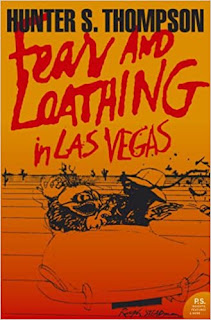Book #38
Fear and Loathing in Las Vegas by Hunter S. Thompson
Fear and Loathing in Las Vegas is the best chronicle of drug-soaked, addle-brained, rollicking good times ever committed to the printed page. It is also the tale of a long weekend road trip that has gone down in the annals of American pop culture as one of the strangest journeys ever undertaken.
I’ve swallowed and drank so much shit with Thompson over the past couple of days that I feel a mixture of wired and hungover just by reading the end of this chaotic, almost slapstick story. I wasn’t expecting this burnout, this utter exhaustion just from reading the exploits of Duke; I am shattered.
In fact, there was a lot here I wasn’t expecting, namely the idea of a fictional autobiography. That Thompson actually took this trip to Vegas, and wrote about it, is bonkers to me. That some of the things here may have happened, whether with embellishments or not, is equally mind-bending. His clever referrals to himself within the novel seem, at face value, to hint at Duke and Thompson being separate entities, but if you truly consider these, it’s entirely abstract. They could be two different guys. They could be the alter ego of each other. One, or both, could be a hallucination, a delusion had by the other. It’s definitely not something that can be easily processed.
This is only strengthened by the utter unreliability of Duke as narrator. He is so completely off his tits for the majority of the novel that it’s impossible to trust any of his senses, memories, or opinions. Thompson’s style only reinforces this by having Duke mention things he’d done or experienced during his trip, which we’d never been given sight of at any point in the text. Some of these events were corroborated by minor characters, but others were totally subjective and again left open to the possibility of being drug-infused visions, or creations of the mind.
I loved these insane shit-fits, but what I loved most of all was Thompsons commentary of America in the sixties. Imagining how Vegas looked and felt at this time was a treat to the thalamus, but to have Thompson describe the general feeling was wonderful. Duke rails against authority, using drugs to numb his prevalent disillusionment with America, the direction of the counterculture, and the widespread fear the Vietnam war was creating throughout the country at the time. He suggests many are attempting to escape the slow existential dread which is seeping into the psyche of Americans.
And, ultimately, the idea that Duke believes he’s in Vegas searching for the American Dream, and finds it in the form of the Circus Circus casino, underlines everything Thompson is telling us here.
There really is so much to discover and analyse with Fear and Loathing, and I think that’s something more suited to a second reading. For now, my delight was in the unreliability, the mayhem, and the strange amalgamation of fiction and non-fiction.

